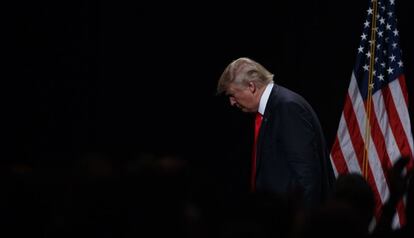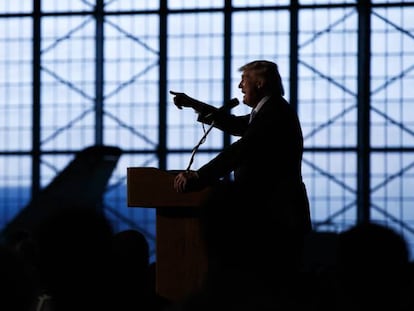50 Republican foreign policy officials warn against a Trump presidency
Group of senior officials say property magnate “would put at risk our country’s national security and well-being”


About 50 individuals who have served in senior positions in former Republican administrations said on Monday in an open letter that a Donald Trump presidency “would put our country’s national security and well-being at risk.” They added that Trump “lacks the character” for office and “would be a dangerous President,” “the most reckless” in American history. Many of the undersigned individuals are important members of the establishment who served in high ranking defense and national security positions.
This warning against a Trump presidency is unprecedented. Especially coming from Republicans who were involved in making some of the most important decisions and in some cases, the worst mistakes —like the war in Iraq— from the Richard Nixon administration in the 1970s to George W. Bush. Also unusual is the tone used to refer to the GOP presidential candidate. “None of us will vote for Donald Trump,” the signatories say. But, they do not reveal whether they will back his Democratic rival, Hillary Clinton.
Trump has failed in his more or less sincere effort to unite the party —something every electoral rulebook says is indispensable to win the presidential election
The list of signatures includes Michael Hayden, former director of the Central Intelligence Agency (CIA) and former director of the National Security Agency (NSA); John Negroponte, former director of National Intelligence; Michael Chertoff and Tom Ridge, former secretaries of Homeland Security; Robert Zoellick, former deputy secretary of state, among others. The 50 signatories are members of that elite group of individuals who have served in security and foreign policy positions in Washington, that constellation of high ranking civil servants and experts needed to kick start any administration. Trump keeps a very small group of foreign policy advisors that does not include any well-known individuals from that circle.
Trump, according to the letter, “lacks self-control and acts impetuously. He cannot tolerate personal criticism. He has alarmed our closest allies with his erratic behavior. All of these are dangerous qualities in an individual who aspires to be President and Commander-in-Chief, with command of the U.S. nuclear arsenal.”
The letter is further proof of that enduring rift between Trump and the Republican establishment. The Bush family —former Presidents George H.W. and George W.— has turned its back on its party’s candidate. Former Republican Secretaries of State Colin Powell and Condoleezza Rice are notably absent from the list of signatories. So are Henry Kissinger and James Baker. Both men held separate meetings with Trump a few months ago. Still, silence this time around does not mean these individuals will not speak up in the future.
Maine Republican Senator Susan Collins published an article on Monday in The Washington Post saying that she would not vote for Donald Trump.
Collins alluded to Trump’s long list of insults as reasons for her decision. She also recalls how he mocked a disabled journalist, suggested that a judge might be impartial because of his Mexican heritage and attacked the family of an American Muslim soldier who died in Iraq.
Sign up for our newsletter
EL PAÍS English Edition has launched a weekly newsletter. Sign up today to receive a selection of our best stories in your inbox every Saturday morning. For full details about how to subscribe, click here
In the past, one lone senator might stand against his party’s candidate. But, in Trump’s case, there are many senators standing up to rally against him. Nebraska Senator Ben Sasse, Illinois Senator Mark Kirk, South Carolina Senator Lindsay Graham have already jumped ship. Representatives Mark Hanna from New York and Scott Rigell from Virginia also said they will not back Trump.
This announcement from Collins, a moderate conservative, is yet another sign that Trump has failed in his more or less sincere effort to unite the party —something every electoral rulebook says is indispensable to win the presidential election.
English version by Dyane Jean-François.
Tu suscripción se está usando en otro dispositivo
¿Quieres añadir otro usuario a tu suscripción?
Si continúas leyendo en este dispositivo, no se podrá leer en el otro.
FlechaTu suscripción se está usando en otro dispositivo y solo puedes acceder a EL PAÍS desde un dispositivo a la vez.
Si quieres compartir tu cuenta, cambia tu suscripción a la modalidad Premium, así podrás añadir otro usuario. Cada uno accederá con su propia cuenta de email, lo que os permitirá personalizar vuestra experiencia en EL PAÍS.
En el caso de no saber quién está usando tu cuenta, te recomendamos cambiar tu contraseña aquí.
Si decides continuar compartiendo tu cuenta, este mensaje se mostrará en tu dispositivo y en el de la otra persona que está usando tu cuenta de forma indefinida, afectando a tu experiencia de lectura. Puedes consultar aquí los términos y condiciones de la suscripción digital.










































